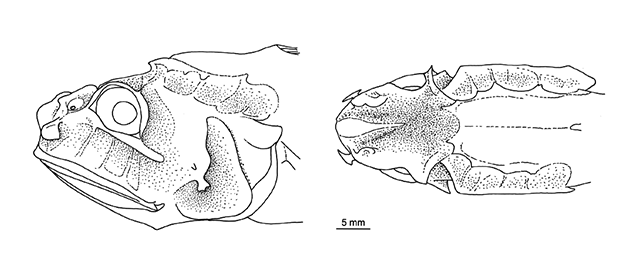| Macrouridae (Grenadiers or rattails) |
| 20 cm TL (male/unsexed) |
|
benthopelagic; marine; depth range 340 - 1348 m |
| Widespread but patchy and discontinuous. Atlantic: Caribbean and continental slope of northern South America. Pacific: off subtropical western and eastern Australia, several islands in the southern Pacific (New Caledonia, Vanuatu, Wallis & Futuna, Marquesas Islands), and off Hawaii. Not recorded from eastern Atlantic nor Indian Ocean. |
|
This species is distinguished by the following characters: a black-colored large-headed fish, with head size 21-25% TL; pelvic fin rays 13-14; pectoral fin rays 13-16; projecting snout, 20-24% HL; head bones are papery thin and often distorted; no barbel; small orbit diameter, 20-24% HL; interorbital width 60-70% HW; infraorbital width 20-25% HL; postorbital-preopercular interspace 10-14% HL; preopercular supporter is very small and forked; gill rakers 21-25; ventral striae reaching to about ? from pelvic fin bases to periproct; small otolith with rounded outline, no predorsal lobe developed; colliculi separated; otholith length to height (OL:OH), 1.0-1.2; total colliculum length to pseudocolliculum length (TCL:PCL) is 2.2-2.8 (Ref. 98298). |
| Found on the continental slope (Ref. 75154). Benthopelagic (Ref. 58302). |
|
Least Concern (LC); Date assessed: 09 October 2018 Ref. (130435)
|
| harmless |
Source and more info: www.fishbase.org. For personal, classroom, and other internal use only. Not for publication.

